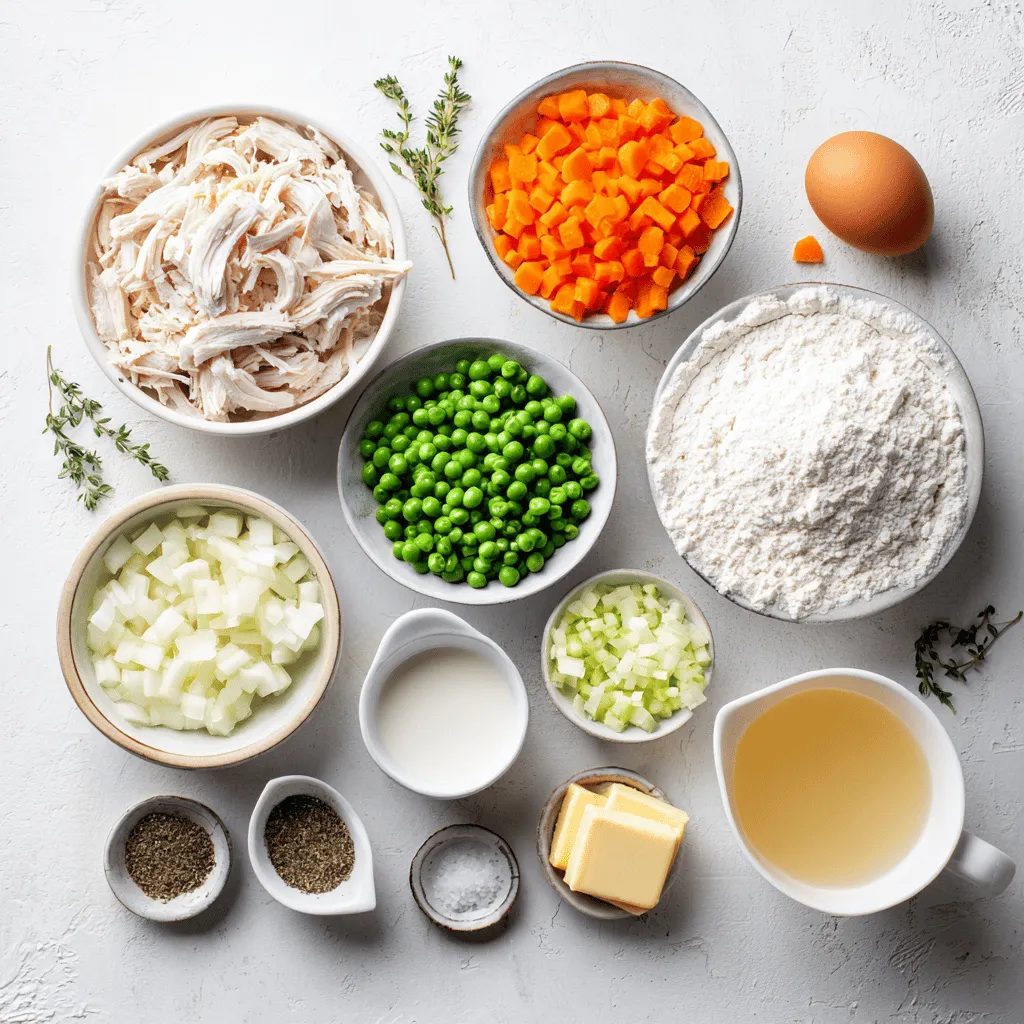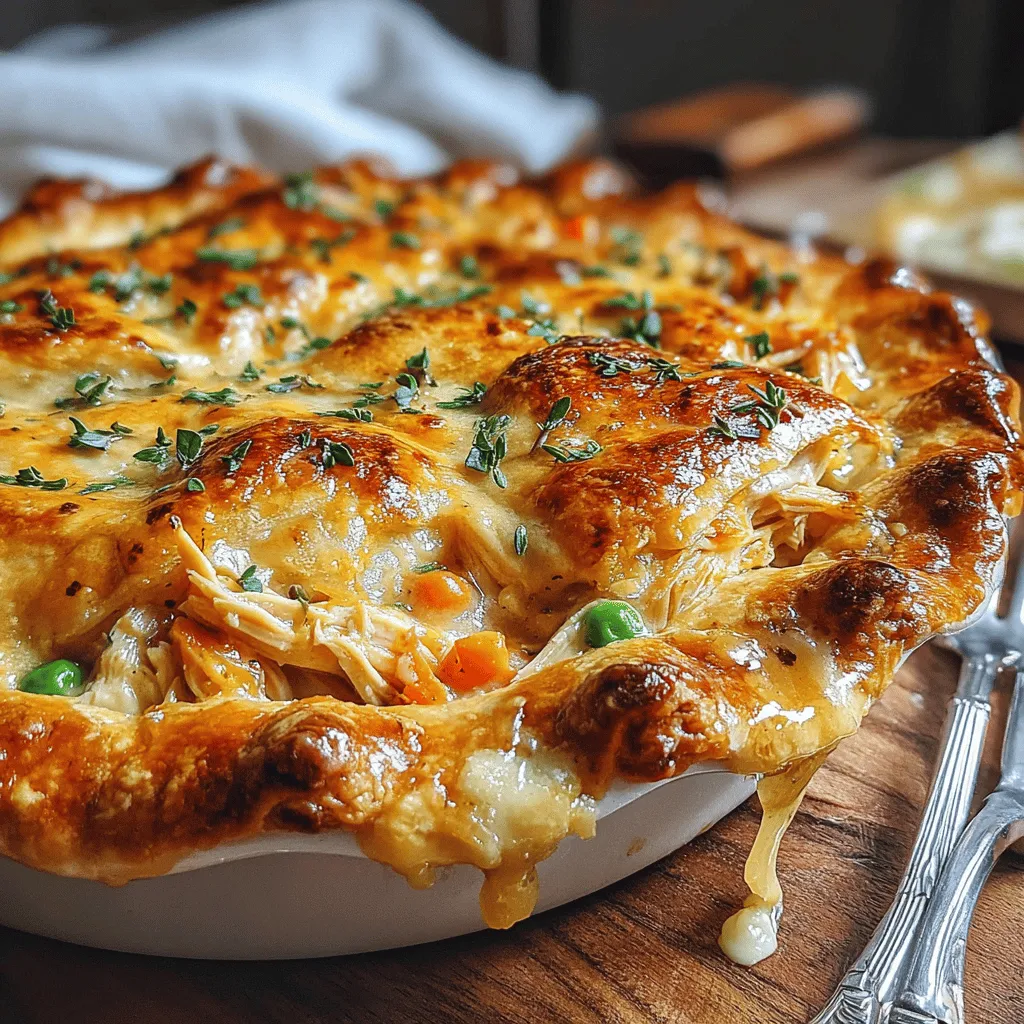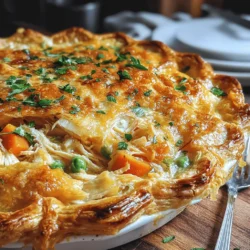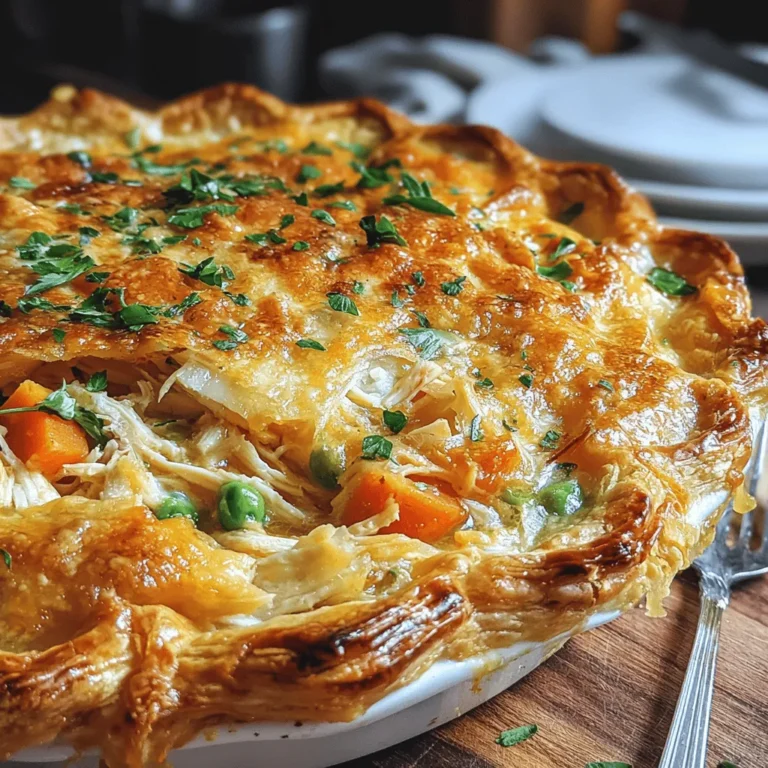Introduction
Chicken pot pie is a beloved comfort food that warms the heart and soul with its rich flavors and satisfying textures. This dish has long been a staple in many households, not only for its deliciousness but also for its ability to bring family and friends together around the dinner table. When made from scratch, chicken pot pie provides a level of flavor and nutrition that is often lacking in store-bought versions.
Creating a flaky crust from scratch is one of the highlights of making your own chicken pot pie. The process can seem daunting, but the reward of that buttery, tender crust encasing a hearty filling is well worth the effort. In this recipe, you’ll learn how to master the art of the flaky crust while making a delicious filling that celebrates the classic flavors of this dish.
Recipe Overview
– Total Time: 1 hour 30 minutes
– Servings: 6
– Difficulty: Medium
Ingredients
– 2 cups cooked chicken, shredded
– 1 cup carrots, diced
– 1 cup peas, frozen or fresh
– 1 cup potatoes, diced
– 1/2 cup celery, diced
– 1/3 cup onion, chopped
– 1/4 cup all-purpose flour
– 2 cups chicken broth
– 1/2 cup milk
– 1 teaspoon dried thyme
– 1 teaspoon salt
– 1/2 teaspoon black pepper
– 1/2 cup cold butter, cubed
– 1 1/2 cups all-purpose flour (for crust)
– 1/2 teaspoon salt (for crust)
– 1/4 cup ice water (more as needed)

Instructions
1. Preheat your oven to 425°F (220°C).
2. In a large skillet, sauté the onions, carrots, and celery over medium heat until softened, about 5-7 minutes.
3. Stir in the potatoes and cook for an additional 5 minutes.
4. Add the chicken, peas, thyme, salt, and pepper to the skillet, mixing well.
5. Sprinkle the flour over the mixture and stir to combine.
6. Gradually add the chicken broth and milk, stirring continuously until the mixture thickens. Remove from heat and set aside.
7. In a mixing bowl, combine 1 1/2 cups flour and 1/2 teaspoon salt for the crust.
8. Add the cold butter to the flour mixture and use a pastry cutter or your fingers to mix until the mixture resembles coarse crumbs.
9. Gradually add ice water, one tablespoon at a time, mixing until the dough comes together. Be careful not to overwork it.
10. Divide the dough in half, shape into discs, wrap in plastic, and refrigerate for at least 30 minutes.
11. Roll out one disc of dough on a floured surface to fit your pie dish. Place it in the dish and fill it with the chicken mixture.
12. Roll out the second disc of dough and place it over the filling. Seal the edges and cut slits for steam to escape.
13. Bake in the preheated oven for 30-35 minutes, or until the crust is golden brown.
14. Let cool for a few minutes before serving.
Understanding Chicken Pot Pie
Chicken pot pie has a rich historical background, with roots tracing back to ancient civilizations that created various forms of meat pies. Over the centuries, it has evolved into a dish that is celebrated in households around the world. Its ability to adapt to different cuisines makes it a favorite—whether it’s filled with a creamy sauce or a savory broth, chicken pot pie remains a versatile dish.
The comfort it provides, along with its hearty ingredients, makes it a go-to meal during colder months. The combination of tender chicken, hearty vegetables, and a creamy filling encased in a flaky crust is a culinary hug in a dish. Not only does it satisfy hunger, but it also evokes feelings of nostalgia and warmth, connecting generations through shared meals.
Ingredients Breakdown
Filling Components
– Chicken: Provides protein and flavor.
– Vegetables: Carrots, peas, and potatoes add nutrition and texture.
– Broth: Creates a rich base for the filling.
– Seasonings: Enhance the overall flavor profile.
Including a variety of vegetables in the filling not only boosts the nutritional value but also adds layers of flavor that elevate the dish.
Flaky Crust Composition
The key to a flaky crust lies in the use of cold butter. When combined with flour, it creates pockets of steam that result in a light and airy texture. Balancing the flour and salt in the crust is crucial for both flavor and structure, ensuring that it holds up well against the filling while adding its own deliciousness.

Tips for Ensuring a Smooth Sauce When Adding Liquids
When making the sauce for your chicken pot pie, it’s crucial to avoid lumps for a velvety texture. Begin by adding liquids gradually while whisking continuously. This technique allows for even distribution and prevents clumping. Consider using a mixture of broth and cream for a rich flavor, and ensure your liquids are warm before adding them to the roux, as this helps to maintain a smooth consistency.
Oven Preparation
Importance of Preheating and Its Effect on Crust Texture
Preheating your oven is a vital step in achieving the perfect flaky crust. When the oven reaches the desired temperature before your pot pie goes in, it ensures that the fat in the pastry begins to melt immediately, creating steam that contributes to the flakiness. Aim for a temperature of 400°F (200°C) for optimal results.
Assembling the Pot Pie
Techniques for Rolling Out Dough and Ensuring Even Thickness
When rolling out your pie crust, use a lightly floured surface to prevent sticking. Roll from the center outwards, rotating the dough frequently to maintain an even thickness. Aim for around 1/8 inch thick for the top and bottom crusts. If the dough cracks, simply patch it up with excess dough and smooth it out.
Tips on Sealing the Edges and Creating a Steam Vent
To seal the edges of your pot pie, use a fork to crimp the edges or pinch them together with your fingers. This not only secures the filling but also creates an attractive design. Don’t forget to cut a few small slits in the top crust to allow steam to escape; this prevents the filling from becoming too watery.
Baking Process
Ideal Baking Times and Temperatures for a Golden Crust
For a perfectly baked chicken pot pie, place it in the preheated oven at 400°F (200°C) for 30 to 40 minutes. Keep an eye on the crust; it should turn golden brown. If the edges begin to brown too quickly, cover them with strips of aluminum foil to protect them from burning.
Signs to Look For to Ensure the Filling is Cooked Properly
To ensure your filling is fully cooked, look for bubbling around the edges of the pie. The filling should be thick and creamy, not watery. A thermometer can also be used; the internal temperature should reach at least 165°F (74°C).
Serving Suggestions
Ideas for Side Dishes that Complement Chicken Pot Pie
Pair your chicken pot pie with a light side salad dressed in a simple vinaigrette to balance the richness of the pie. Alternatively, serve it with crusty bread to soak up any extra filling. Roasted vegetables or steamed green beans also provide a nutritious side option.
Suggestions for Garnishing the Pie for Presentation
For an appealing presentation, sprinkle fresh chopped parsley or thyme over the top of the golden crust just before serving. This adds a pop of color and a hint of freshness that enhances the overall dish.
Variations and Customizations
Options for Different Proteins
While chicken is the classic choice, feel free to experiment with other proteins. Turkey pot pie is a fantastic alternative, especially after the holidays. For a heartier version, consider using beef or a vegetarian mix of mushrooms and lentils for a meat-free option.
Substitutions for Seasonal Vegetables or Dietary Restrictions
Utilize seasonal vegetables to keep your pot pie fresh and vibrant. Carrots, peas, and corn are traditional, but feel free to add butternut squash or zucchini. For those with dietary restrictions, gluten-free flour can be used to make a suitable crust.
Creative Twists on Flavors
Enhance your pot pie with a variety of herbs and spices. Thyme, rosemary, or even a hint of nutmeg can elevate the dish. For a spicy kick, consider adding a touch of cayenne pepper or chili flakes to the filling.
Nutritional Information
Breakdown of Calories, Protein, Fats, and Carbs Per Serving
A typical serving of homemade chicken pot pie contains approximately 400-500 calories, with around 20-25g of protein, 20-30g of fat, and 30-40g of carbohydrates. The exact values will depend on the ingredients used, but homemade versions generally offer healthier options compared to store-bought, which often contain preservatives and artificial additives.
Discussion on How Homemade Meals Offer Healthier Alternatives
By making chicken pot pie from scratch, you have control over the ingredients, allowing you to reduce unhealthy fats and sodium. This not only enhances the nutritional value but also provides a satisfying meal made with love.
Conclusion
Making a homestyle chicken pot pie is a delightful experience that brings warmth and comfort to any table. Embrace the opportunity to personalize your pie with unique flavors and ingredients that your family loves. Explore various combinations and techniques, and enjoy the satisfaction that comes from creating a homemade meal. With each bite, you’ll savor the joy of cooking and the comfort of shared family moments.

